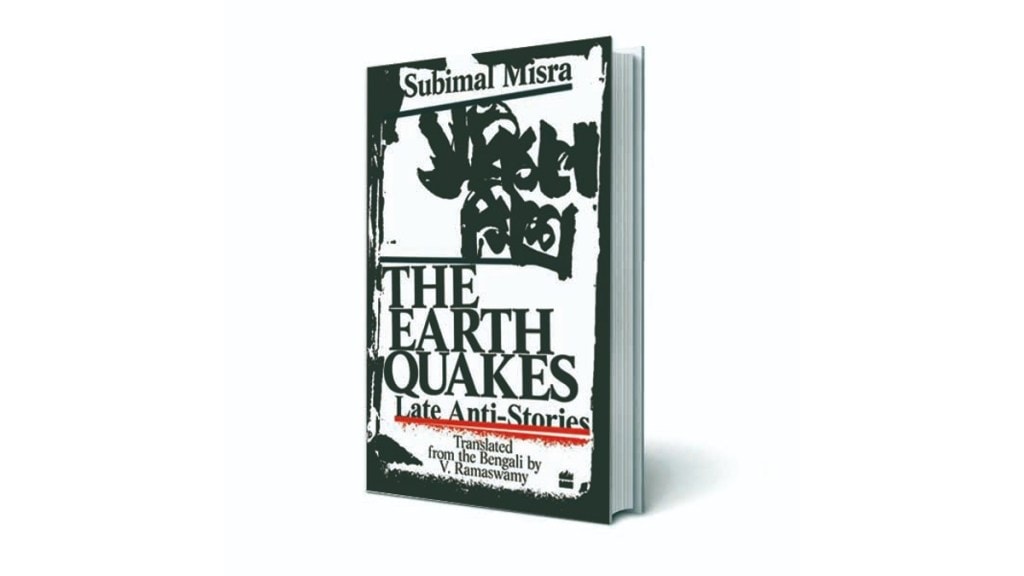Early in his long literary career, Bengali writer Subimal Misra decided to publish his works only in little known publications. For the Kolkata-born Misra, who passed away in February last year, his experimental writings were anti-stories and anti-novels. He would often quote French filmmaker Jean-Luc Godard and Irish writer James Joyce. He wrote for the ordinary reader and stayed clear of market forces dictating his style. Misra, who was born in 1943, abhorred the “arrogance of education” and considered the modestly educated, ordinary, middle-class readers as his favourite audience.
“Reading Subimal Misra is always educational,” says his translator V Ramaswamy, who has just completed his more than a decade-long project of translating the author’s works into English. The Earth Quakes: Late Anti-Stories, the fourth and last part of the translation project, combines Misra’s final works between 1991 and 2010. Twenty short stories form the new translation, which follows The Golden Gandhi Statue from America (2010), the first part of the project based on the early stories of Misra during 1960s and 1970s, Wild Animals Prohibited (2015), the second part and the stories he wrote during the 1970s and 1980s, and This Could Have Become Ramayan Chamar’s Tales: Two Anti-Novels (2019), the third part and the first translations of his novels.
“Misra likened his early stories to the beginning of a staircase, which readers needed to ascend to access the later phases of his writing,” explains the Kolkata-based Ramaswamy, who has also translated the works of Bengali writer Manoranjan Byapari (The Runaway Boy, The Nemesis). An anti-establishment writer, Misra mirrored the prejudices and injustices of society in his writings, in a style that was designed to provoke the reader.
In Memory Game (original Bengali title Madankatkati), one of his 20 short stories in The Earth Quakes: Late Anti-Stories, the author narrates a fictional tale of Tarzan interwoven with commentaries from contemporary society, for example, the beginnings of the Vishwa Hindu Parishad and its Ram Janmabhoomi movement. The Great Renunciant, the first story in the collection, paints a painstaking portrait of a folk singer and dancer who performed khemta and sang gambhira and jhumur songs. The long artistic life of Jharuprasad Naskar, the folk singer and dancer born in the early 20th century, is narrated with the help of reports from journals and newspapers, before the author “humbly submits” he was not aware if such a folk performer existed.
Written in 2010, Nappy Change, another of Misra’s short stories in the new collection, is reminiscent of today’s society. The story centres on the gangrape of a teenage village girl waylaid while she was relieving herself early morning in a field. After the rape, the girl’s body was burnt by the group of men to destroy evidence. “The ruling party said: We believe in democracy, we believe in people, it is humanism that is the core belief of our party. Our people can never commit an act like this. This could only have been done by the opposition,” goes the short story. “The opposition party said: This could only have been done by the ruling party. The public will not tolerate this. We will call a Bengal Bandh on this issue.”
“I see the stories, or anti-stories, as prose-text works of our times which the author has chosen to write and publish,” says the translator about the subjects Misra handles in his writings, whether it is the 1991 Gulf War that heralded a unipolar world or the 2006 Singur movement which led to the end of the more than three-decade-long Communist rule in West Bengal. “Translating Subimal Misra made me into a translator of ‘voices from the margins’,” adds Ramaswamy in his translator’s notes in the book. Misra, who refused to follow guidelines, didn’t also believe in guiding new writers. “I don’t possess the capability to offer any advice. Great folks can do all that, sages can do that. One has to learn as one treads the path,” he says in a conversation with Bengali writer Swapan Ranjan Haldar in 2010, which is part of the book. Misra stopped writing in 2012 following poor eyesight and ill health.
Faizal Khan is a freelancer








